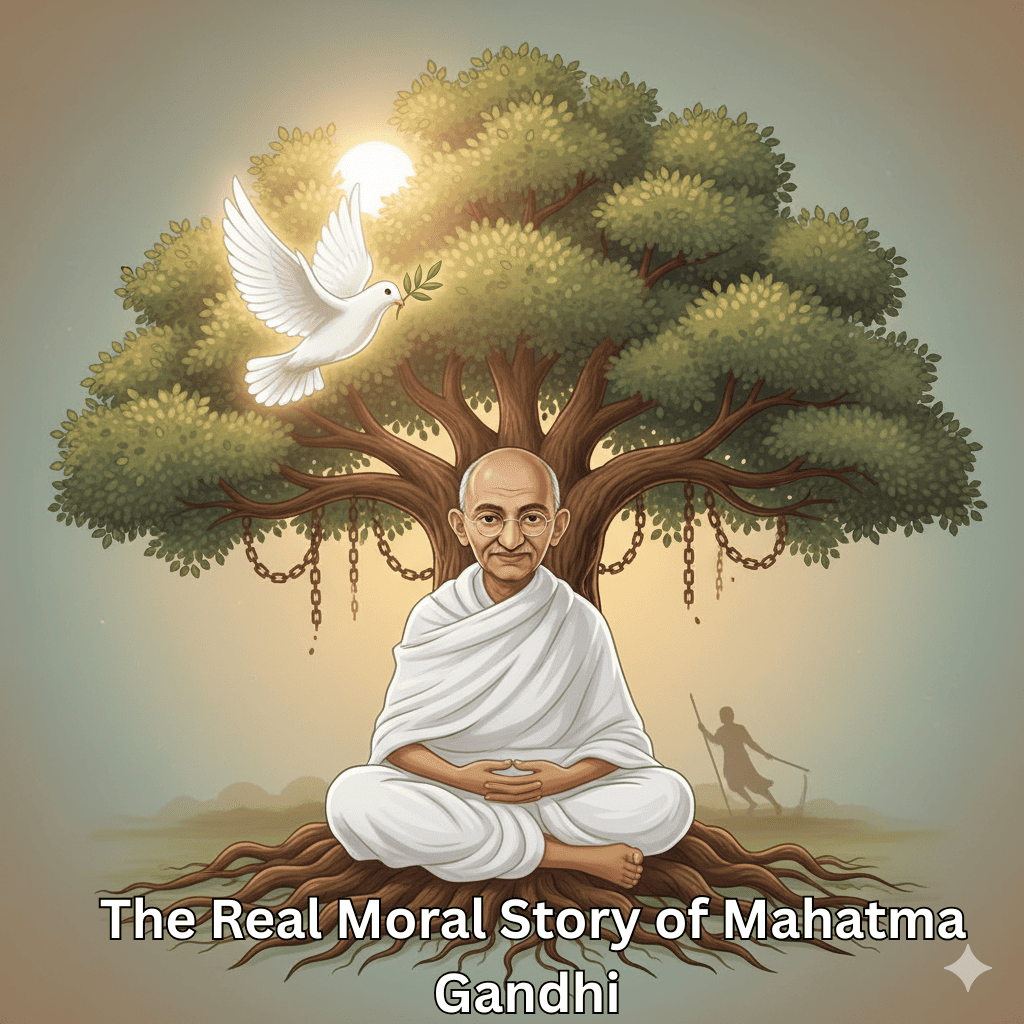The Real Moral Story of Mahatma Gandhi – The Power of Truth and Non-Violence
By: Compiled from various sources | Published on Oct 16,2025
Category Moral Stories

The Real Story of Mahatma Gandhi: A Life of Truth and Peace
Introduction
When you think about inspiring lives, Gandhi is hard to beat. He lived simply, believed deeply in truth and non-violence, and proved that real strength comes from standing firm in what’s right, not from fighting with weapons.
Gandhi didn't just free India—he proved that one person with enough conviction could change the world without violence. He proved that sticking to your beliefs—no matter the cost—can move mountains. It's not just history. It's a blueprint for living with integrity and courage.
Early Life of Mahatma Gandhi
Mohandas Karamchand Gandhi was born on October 2, 1869, in Porbandar, a small town in Gujarat, India. As a child, he was shy but deeply honest. His father, Karamchand Gandhi, was a respected government official, and his mother, Putlibai, was very religious and taught him the values of truth, devotion, and vegetarianism.
When Gandhi went to London to study law, he faced a world very different from his hometown. Adjusting to Western culture was challenging, but he never gave up his beliefs. During this time, he dove into religious texts—the Bhagavad Gita, the Bible, the Quran. These readings helped him understand that truth and love are universal, connecting all humanity.
A Turning Point in South Africa
After finishing his law studies, Gandhi moved to South Africa in 1893 to work as a lawyer. Here, he encountered racial discrimination for the first time. On one train journey, he was thrown out of a first-class compartment despite having a valid ticket—simply because of his skin color. The humiliating incident changed everything for him
Instead of responding with anger, Gandhi chose to fight injustice peacefully. He organized meetings and campaigns for the rights of Indians in South Africa. This was where his philosophy of “Satyagraha”—the force of truth—was born.
Through non-violent resistance, Gandhi showed that true courage isn’t about weapons but about standing strong with moral conviction. His work in South Africa earned him respect and eventually the title “Mahatma,” meaning great soul.
The Indian Freedom Struggle
Gandhi returned to India in 1915, finding a nation under British colonial rule, struggling with poverty and injustice. Gandhi believed India couldn't win freedom through violence—only through unity and truth. So he traveled the country, meeting farmers, laborers, and villagers, listening to their struggles firsthand.
In 1917, Gandhi led his first major movement in Champaran, Bihar, fighting for poor farmers forced to grow indigo for the British. His victory inspired millions. Soon after, he led larger campaigns like the Non-Cooperation Movement (1920), the Civil Disobedience Movement (1930), and the Quit India Movement (1942).
One of the most iconic events was the Dandi March in 1930. Gandhi walked 240 miles from Sabarmati Ashram to Dandi to protest the British salt tax. That single march rippled across the entire nation. People everywhere started resisting British rule. And Gandhi? He went from being India's leader to becoming the world's most recognized champion of non-violence.
Gandhi’s Philosophy of Life
What made Gandhi extraordinary was his unwavering commitment to truth (Satya) and non-violence (Ahimsa). He believed that truth is God and that one must live it in every action, no matter how difficult.
Non-violence, for Gandhi, wasn’t just avoiding physical harm—it meant practicing patience, forgiveness, and love, even toward one’s enemies. His simple lifestyle, spinning his own clothes, and vegetarian diet were reflections of his values.
Gandhi pushed Indians to stop depending on British goods. Make your own cloth, he said. Spin your own thread. That simple spinning wheel became more than a tool—it was a declaration of independence. Gandhi proved something the British Empire didn't understand: you don't need violence or money to change the world. You just need to be unshakeable in what's right.
Challenges and Sacrifices
Gandhi’s journey was far from easy. He was imprisoned many times, criticized by political opponents, and sometimes misunderstood even by his followers. Yet, he never wavered in his principles. Through everything, he stuck to two things: truth and non-violence.
ou've probably heard Gandhi's line: "An eye for an eye makes the whole world blind." But he didn't just quote it at rallies. He actually lived that way—with patience that seemed impossible, with forgiveness when others wanted revenge. People saw him as more than a freedom fighter. He was showing them how to be better humans.
Sadly, on January 30, 1948, Gandhi was assassinated during a prayer meeting in New Delhi. His death shocked the world, but his ideals continue to inspire generations.
Moral of the Story
The life of Mahatma Gandhi teaches us that truth and non-violence are the most powerful tools anyone can have. No matter how big the challenge, standing firm with honesty, patience, and love can bring real change.
What made Gandhi so powerful wasn't his strategy or his speeches. It was that he actually lived the way he told others to live. That authenticity? It's what inspired millions. One person, guided by conscience and compassion, can challenge injustice without hatred or violence.
Life Lessons from Mahatma Gandhi
-
Be truthful in every situation: Truth may take time, but it always wins.
-
Practice non-violence: Peace creates lasting change, unlike violence.
-
Stay humble and simple: True greatness comes from simplicity, not luxury.
-
Believe in self-reliance: Learn, create, and grow independently.
-
Forgive others: Forgiveness is a sign of strength, not weakness.
Conclusion
Here's the thing about Gandhi: his life wasn't just relevant for 1940s India. The way he approached conflict, the way he valued truth over convenience, the way he lived simply—that still speaks to us. Maybe especially now, when everything feels so fractured.
The moral story of Gandhi belongs not just to India but to all of humanity. Gandhi's life boils down to this: you don't need an army to change things. You just need conviction. And the freedom he was really after wasn't just about kicking out the British. It was deeper—the freedom to be honest, to choose peace, to treat others with decency.
Amazon Affiliate Disclosure
As an Amazon Associate I earn from qualifying purchases.
Comments
No comment yet. Be the first to comment

.png)
.png)
